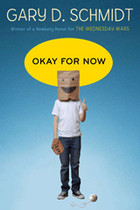This week I am celebrating the arrival of a new shipment of books. These are student requests, or recommendations from library friends, or books I read over the summer that I thought our students would like.
The two titles below were the first I grabbed out of the box. They are both "grippers", though for very different reasons.
Okay For Now, by Gary D. Schmidt
Our narrator, Doug, has just moved to a new town thanks to his father's inability to hold down a job. The town is nothing special and Doug's first response to new people is surliness combined with regret. He doesn't want to be like his older brothers or his father: angry and bitter and mean, and yet his defenses are up. He's prepared to be hated since that's what he gets at home.
Doug's been dealt a losing hand. He's trying to find a way out, and the starting point begins at an unlikely spot: his public library. There he discovers a book of Audubon plates, kept in a glass case. Drawn to the birds and a need to figure out how they were created, he finds purpose and passion.
The supporting characters round out the novel. They are mostly adults: some we love, some we hate. They give Doug a foil to test himself on. How will he respond to the kindness of his science teacher? How will he react to the brutal unfairness exhibited by his PE teacher? The choices he makes as he interacts with them move him forward to shaping the "him" he wants to be.
So why so gripping? Partly it's our love for Doug and our intense yearning to see him find something good in life, partly it's our rage about the brutality he faces and gracefully rejects, partly it's our fear that he has more hard times ahead. Mostly it's great writing, engaging us through direct address and sardonic tone. Our narrator checks to be sure we're paying attention and punctuates a rough patch with a simple "terrific" to let us know exactly how he feels (So NOT terrific!).
Recommended for grades 5 and up.
Black Radishes, by Susan Lynn Meyer
Gustave enjoys a happy childhood in 1940's Paris until his parents force the family to move to the countryside to lay low during a time of increasing antisemitism. As with other Holocaust-era novels, our characters have no idea of the horrors to come; they make their choices in disbelief as circumstances become worse and worse. With each decision, they imagine that it can't get worse.
Such is the case here as well. But here, we have a rendering of the downward spiral as seen through the child's eyes and set in the seemingly harmless French countryside. The town Gustave's family moves to provides some small comfort: although they cannot escape France altogether due to bombed bridges, it is not inside the German occupied zone. Perhaps they can weather the war, and piece together a life based on necessary risks such as crossing the line for food.
This is the tension that keeps us turning the pages. Gustave is a charming though not particularly complex character, and we want his life story to end well. At the same time, we know what could happen. Will the necessary risks lead them to freedom or despair? This is the question of all such novels and it never fails to grip readers.
Recommended for grades 4 and up.



No comments:
Post a Comment